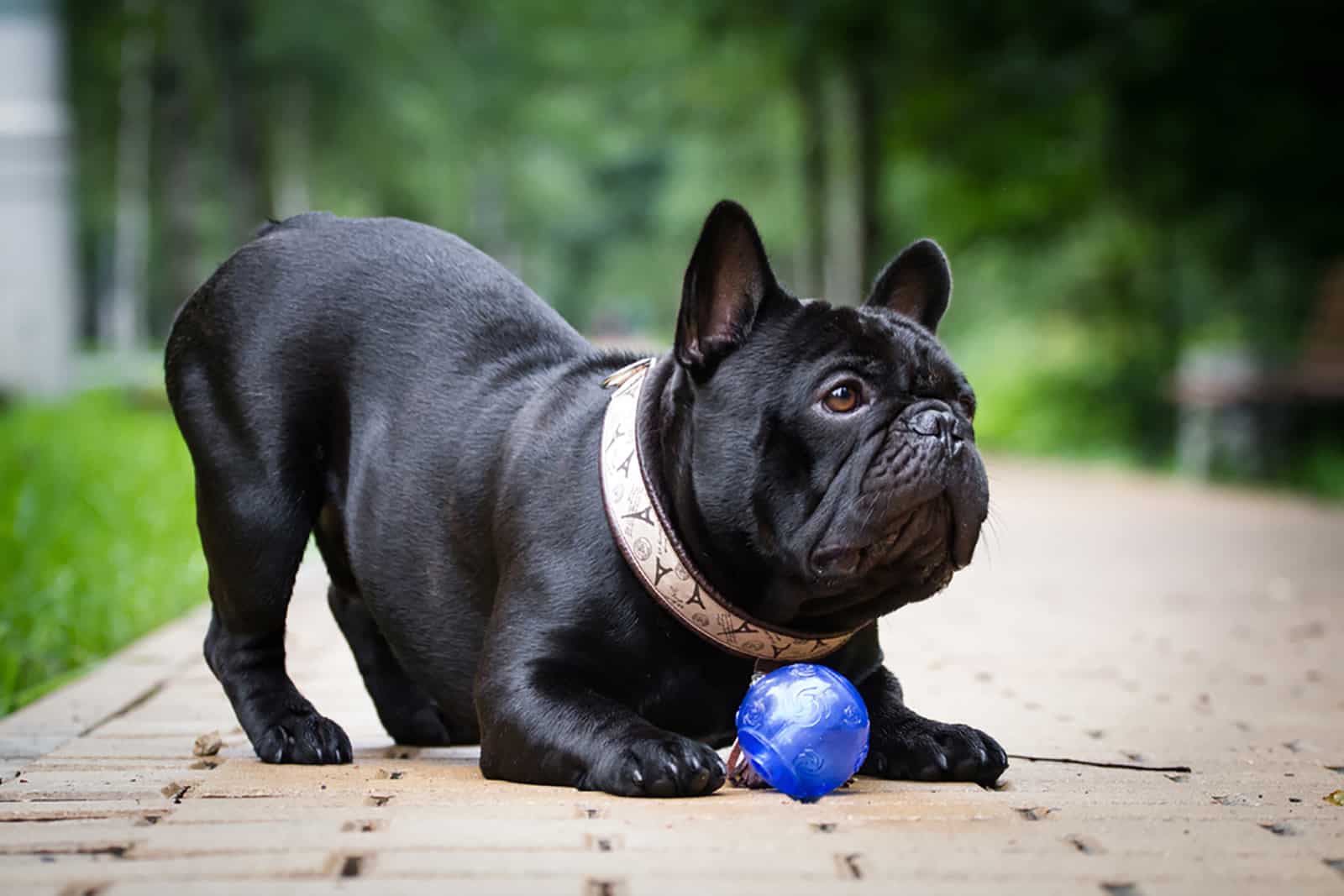The black French Bulldog is a small breed, usually considered a companion dog or a toy dog, with a distinct black coat that adds to its overall royal and attractive appearance.
It is an ever-present dog breed, owned by people of all ages and backgrounds. In fact, in a list published in 2020, the American Kennel Club listed the French Bulldog as the second most popular breed in the United States, behind only the Labrador
Retriever, and ahead of breeds like the Poodle, Bulldog, or even the German Shepherd.
There are plenty of reasons why the breed is so beloved across the world, but in this article, we will be focusing on one particular version of the Frenchie, and that is the Black French Bulldog.
What Is a Black French Bulldog?
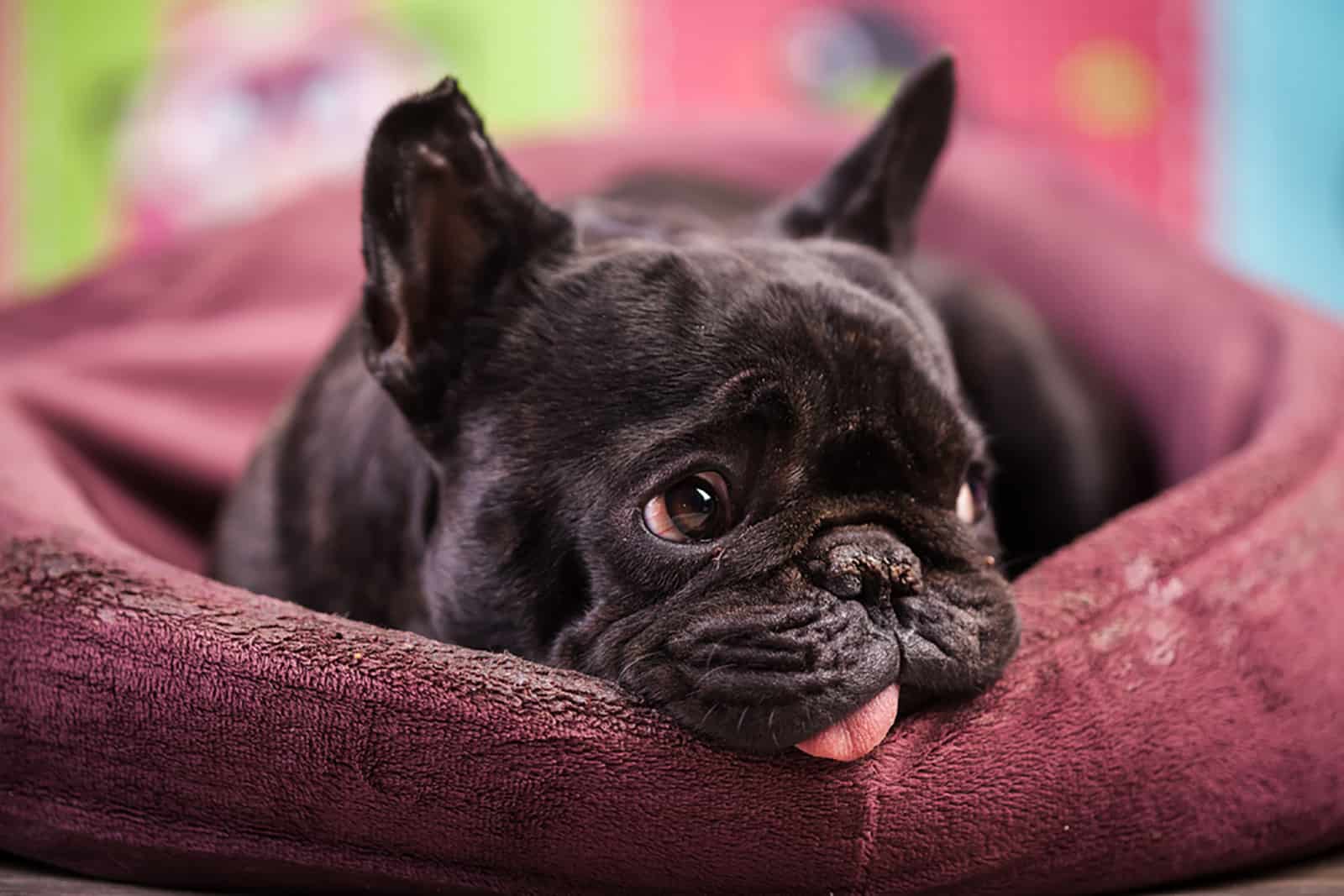
The Black French Bulldog is a type of small dog, easily recognizable by its distinctive coat. It’s most commonly solid black without any white spots or patterns like pied, brindle, or piebald.
The Black Frenchie is not a distinct breed in its own right, but rather a subtype of the French Bulldog breed.
Before delving into more detail about Black Frenchies specifically, let us first get more closely acquainted with the fascinating story of the French Bulldog breed in general.
Black French Bulldog Dog Breed History
At the height of the industrial revolution in the 19th century, English cities such as Nottingham were a common home for many small English Bulldogs.
However, during that same time, a lot of the factory workers began moving to France and bringing their dogs with them.
The toy Bulldogs became very popular in France and breeders quickly started crossbreeding them with local breeds, like Terriers and Pugs. See more about the adorable mix of the English Bulldog and the Pug.
Over time, this practice eventually led to the creation of a new breed that they called Bouledogue Français.
Translated into English, that means the French Bulldogs, which is the name that we are so familiar with today.
French Bulldog Size
Frenchies grow to anywhere between 11 and 13 inches (28 to 33 cm) in height and can weigh up to 28 lbs (13 kg).
Their size was one of the main driving forces in their early rise in popularity during the mid-19th and early-20th centuries. The fact that they were so small meant that they could easily be kept in small apartments.
This was convenient in a society that was rapidly industrializing and gravitating towards life in the big cities. You no longer had to have a house with a backyard in order to have a pet, which is a fact that is still relevant today.
French Bulldog Breed Traits
Their history has dictated many of the traits that are still visible in modern Frenchies.
Even though some of their related breeds — like the English Bulldog or the Boston Terrier — were bred for fighting, Frenchies were designed to be companion dogs from the very start.
This makes them very affectionate and family-oriented. They are very well-behaved around children, and their general openness and outgoing personality make them a very sociable breed.
One downside of their personality is that the attachment they develop towards their owners can sometimes make them a bit clingy. They enjoy constant contact and attention and are quite prone to separation anxiety if left alone for long periods.
French Bulldog Colors
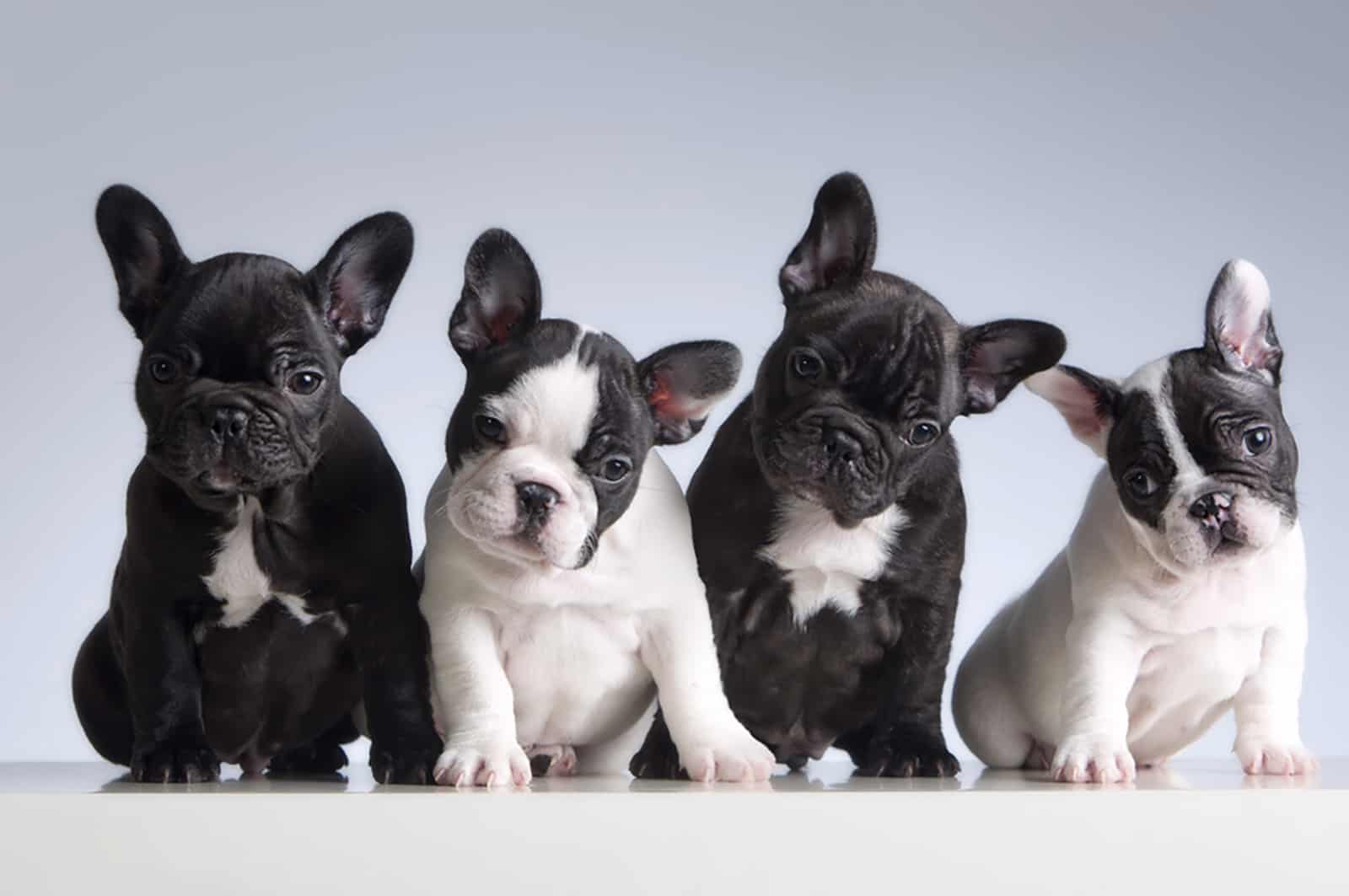
These stocky little animals come in a wide variety of different colors, and some of them are rarer than others.
The standard French Bulldog coat colors are white, brindle, cream, and fawn; plus different combinations of these.
However, there are many other non-standard colors, such as sable, blue, brindle, chocolate, lilac, blue fawn, Isabella, and of course — black. These are mostly caused by a dilution in the recessive gene.
Producing some of these shades is no easy task. Even the most well-versed and experienced breeders sometimes have to go through entire generations of French Bulldog puppies in order to get a rare color.
Additionally, some of the recessive genes that cause rare colors can sometimes cause the Frenchies to be more sensitive and prone to disease.
For this reason, some colors are disallowed, which makes many breeders stay away from them and focus on the healthier variants.
Read More: Isabella French Bulldog: Earth’s Rarest Jewel?
What Is the Most Popular Color In Frenchies?
Depending on your criteria and your taste, there could be many answers to this question. After all, there is no such thing as a “best coat color” that everybody would agree on.
However, if we are trying to generalize, then we would say that the brindle French Bulldog is the most popular.
We say this simply because solid brindle and various brindle combinations are the most represented colors of this breed, and practically every litter is bound to have at least one puppy with this shade.
After brindle, the most common type is the fawn French Bulldog.
Black Coat In French Bulldogs
These little furballs are known for their distinguished solid black coat, although sometimes they can have a few white markings.
However, a lot of people don’t consider those with white markings to be “pure black” and they label them either as black and white French Bulldogs or black brindle French Bulldogs.
Just like other coats in Frenchies, the black is also incredibly smooth, short, and soft to the touch.
Aside from their unusual color, Black French Bulldogs normally have all the features of the breed standard. This includes height and weight, as well as the trademark flat face, wrinkled nose, and bat-like ears.
On the rarest of occasions, they can have blue eyes.
Are Black French Bulldogs Rare?
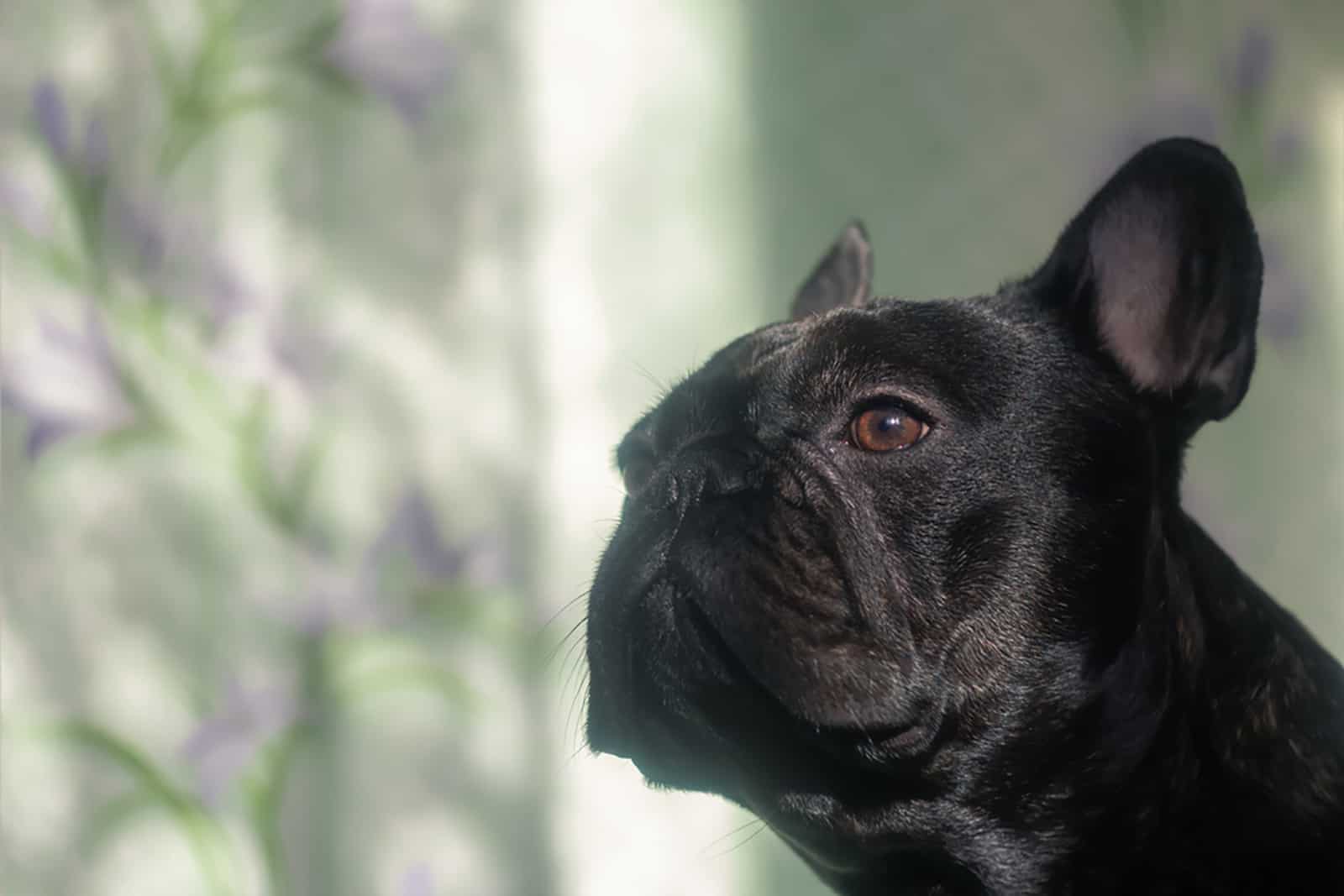
Yes, Black French Bulldogs are extremely rare and difficult to find, particularly if you are looking for a solid black coat with zero white spots.
There are cases when a dog appears to be completely black but, upon closer inspection, they end up having patches of brindle.
The genetic make-up required to produce a fully Black French Bulldog is incredibly complex and it cannot occur naturally.
Breeders can often spend years trying before they successfully produce even one black puppy.
There are also other factors at play, including some potential health issues that discourage breeders from seeking this color, but we’ll get into those later on in the article.
Speaking of rarity, there are even rarer types of Frenchies than black. Merle French Bulldogs are pretty high on that list, but at the top is probably the blue French Bulldog.
Its variants, especially the blue merle and the blue brindle, are widely considered to be the rarest of them all.
Does the AKC accept Black French Bulldogs?
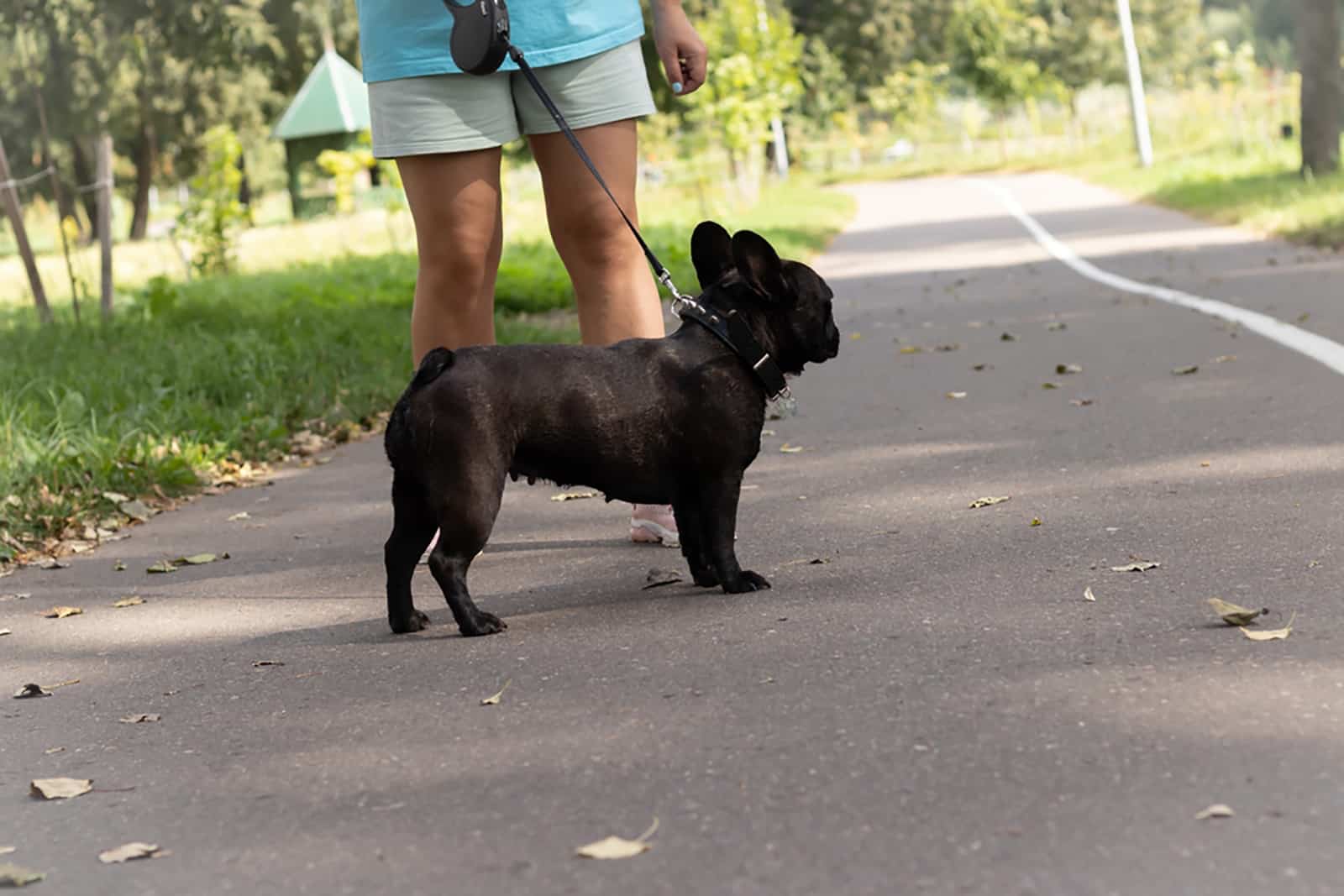
The American Kennel Club does not list Black French Bulldogs as an official breed standard.
The reason for this is that pure black coats in Frenchies can’t happen naturally, and they are thus labeled as “fad colors”, and not considered purebred.
The AKC generally discourages breeders from creating dogs in fad colors because they can cause the breed long-term harm and even serious health troubles.
While we’re on the subject, here is a list of all the coat colors that the AKC accepts as being standard in French Bulldogs:
Brindle, brindle & cream, cream, fawn, fawn & white, fawn brindle & white, white, white & brindle, and white & fawn color.
In addition to these color combinations, the AKC will sometimes accept Frenchies that have a “black mask”, i.e. if their muzzle is black and the rest of their body isn’t.
Black French Bulldogs Health Issues
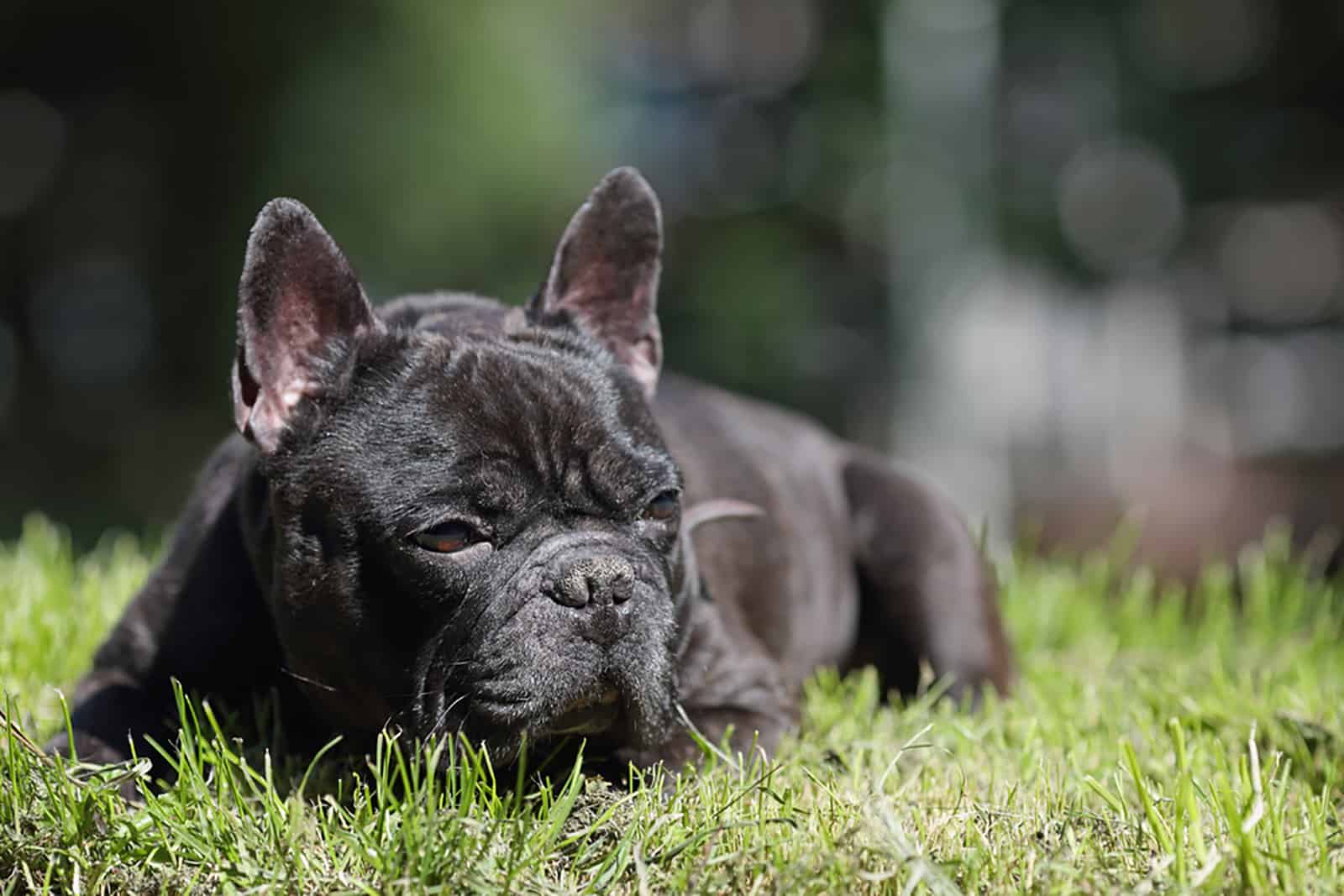
Any coat color that doesn’t appear naturally in dogs and is purely the result of guided breeding is more likely to be related to different medical conditions.
Unfortunately, that is the case with Black Frenchies, who are extra sensitive due to their unique build and history of crossbreeding.
Let’s look at some of the most frequent health problems that affect Black French Bulldogs.
Allergies
All dogs can be troubled by allergies, but because of their unique genetic background, black French Bulldogs are more prone to them than others. If you suspect that your pet has an allergy, please get in touch with your vet as soon as possible.
Here are some symptoms you should watch out for:
Constant itching or licking; red rash-like patches on the paws; watery eyes; frequent sneezing; sudden weight loss; diarrhea or bloody stool.
Eye & Ear Issues
The gene that causes the black coat can often carry a greater risk of both eye and ear problems.
Deafness, in particular, is a big problem, and there is a large correlation between Frenchies having a black coat and going deaf at some point in their lives.
Be wary of symptoms, including excessive ear scratching, redness inside the ears, and a high accumulation of earwax. Learn more in our article on the dog earwax color chart.
And if you remember, we briefly mentioned that black Frenchies can occasionally have blue eyes. Well, blue-colored eyes are usually highly susceptible to infections and diseases like pink-eye or corneal ulcers.
Some early signs of eye infections are redness or swelling around the eyes, as well as frequent scratching and blinking.
Bone & Joint Problems
Many small dogs are prone to issues with their spine, and it’s no different with black French Bulldogs. Some of the conditions that are known to strike these dogs are hip dysplasia, intervertebral disc diseases, patella luxation, and/or butterfly vertebrae.
These conditions can be extremely painful for dogs and we can’t stress enough how important it is to have regular veterinary visits if you own a black Frenchie.
Symptoms for bone and joint-related issues are various, but they usually manifest themselves in the dog’s movement.
If you notice that your Frenchie starts moving weirdly, skipping, or dragging their paws, a check-up is advised.
Skin Conditions
The wrinkles on a French Bulldog’s face are sometimes the target of conditions such as dermatitis or pyoderma. These are most commonly manifested via redness or pus sores around the affected area, usually causing the dog to scratch excessively.
Brachycephalic Syndrome
Brachycephalic Syndrome is something that dogs with short and flat muzzles often struggle with. In fact, that particular head shape is the very thing that gave the disease its name.
The flat snout of the French Bulldog can cause obstructions in the windpipe, which makes breathing harder, especially through the nose.
There are surgical procedures that can fix this condition and allow your Frenchie to breathe more easily, but it’s important that it’s discovered early.
Keep an eye out for signs like sleep apnea, snoring, vomiting, or heat exhaustion.
How Long Do Black French Bulldogs Live?
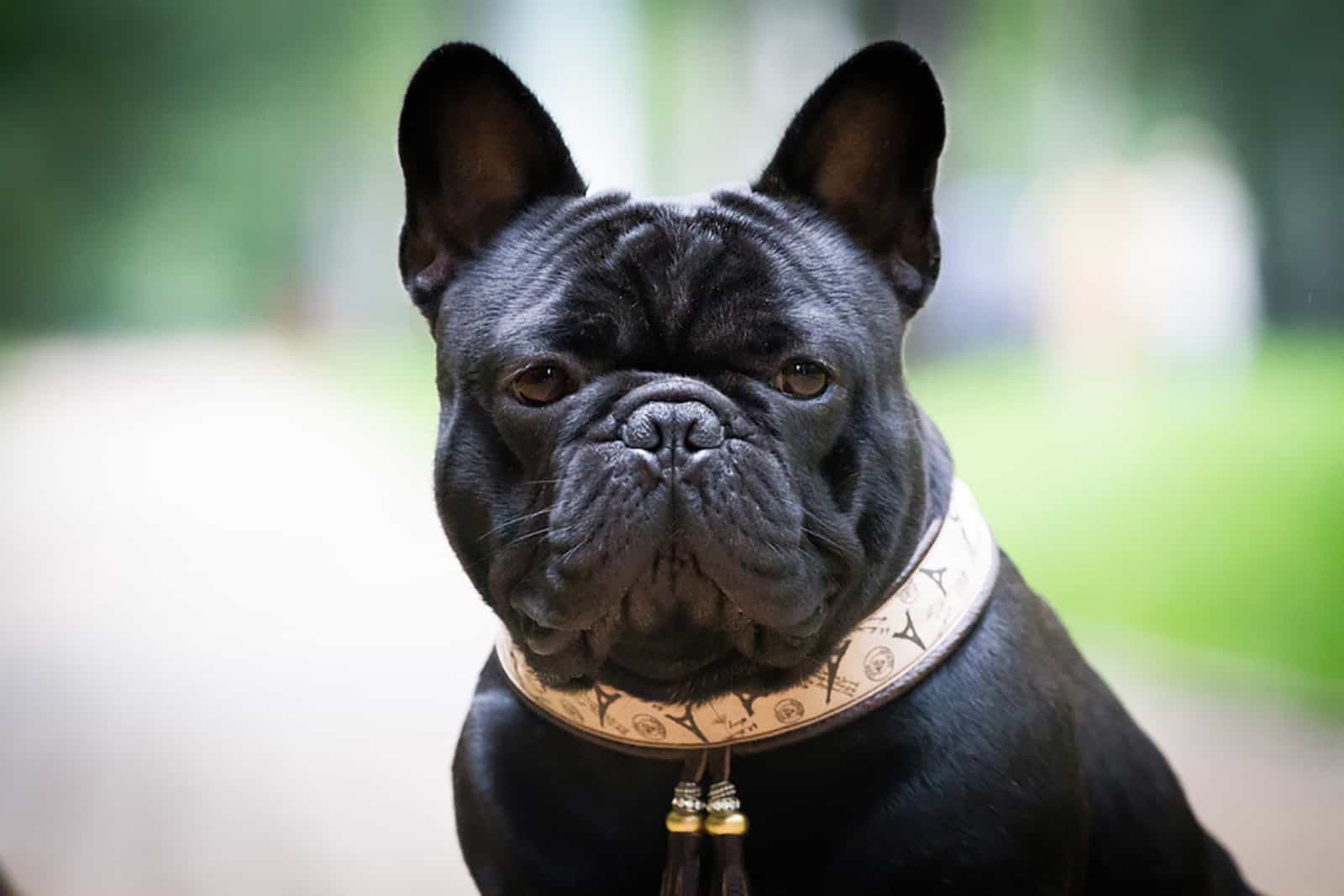
Black French Bulldogs have a life expectancy of around 10 to 12 years. This is a pretty long lifespan in theory, but it’s predicated on the Frenchie not having any predispositions for severe health problems.
They usually stop growing at around 12 to 14 months of age, and that is considered to be the start of their adulthood.
If the dog’s genetic background is good, and you shower them with love and provide all the necessary care, there is no reason why the little bat-eared goofballs shouldn’t live to their old age.
Taking Care of Your Black Frenchie
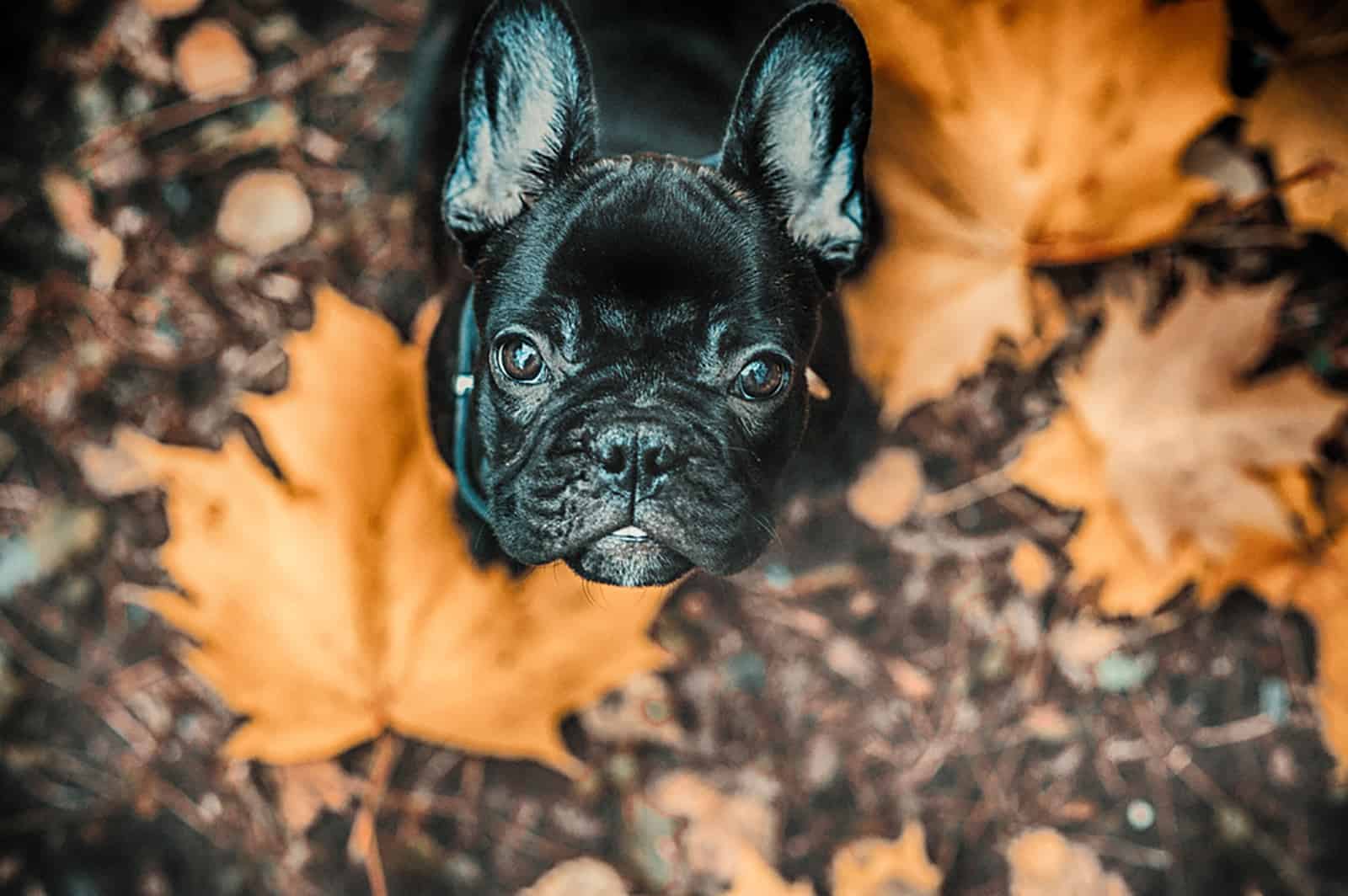
Speaking of providing them with all the necessary care, it’s time that we talk about it in more detail.
Like every loving pet owner, you want to put in as much effort as you can to provide the best possible life for your dog, so here are some tips on how to do just that.
Let’s start with their dietary requirements first, and then we will move on to exercise, training, and grooming.
Diet
Because of their diminutive build, black Frenchies don’t need a lot of food — around 1.5 to 2 cups of dog food per day should be enough. Just keep in mind that you should split this amount into two daily meals, as this will minimize the risk of bloat.
They may not need a lot of food, but they do need it to be high quality. It’s best to check the nutritional value of the food you buy — or buy from highly trusted brands — to make sure your Frenchie is getting everything that is necessary.
You can use our French Bulldog feeding chart as a guideline for your black Frenchie’s diet.
Exercise
They’ve historically lived with people in small apartments in big cities, which means they have never been used to a lot of exercise. This remains the case to this day, so a couple of short walks a day should be enough to keep them stimulated.
They don’t handle high temperatures well, so try to take those walks in the mornings and evenings when it’s a bit cooler.
Training
French Bulldogs are extremely intelligent, receptive to orders, and eager to please. This makes it fairly easy for them to be trained early on in their lives. And once they pick up those good habits, they should stick with them forever.
However, since they need a fairly high degree of mental stimulation, they will get bored quickly if you don’t make the training interesting and dynamic.
Grooming
Since their coat is very short, they aren’t particularly needy when it comes to grooming. They are average shedders and don’t get dirty that easily.
Brushing them occasionally and giving them a bath every two or three months should be more than enough to cover the basic hygienic needs, but you should also try to regularly clean their ears, brush their teeth, and trim their nails.
How Much Does a Black French Bulldog Cost?
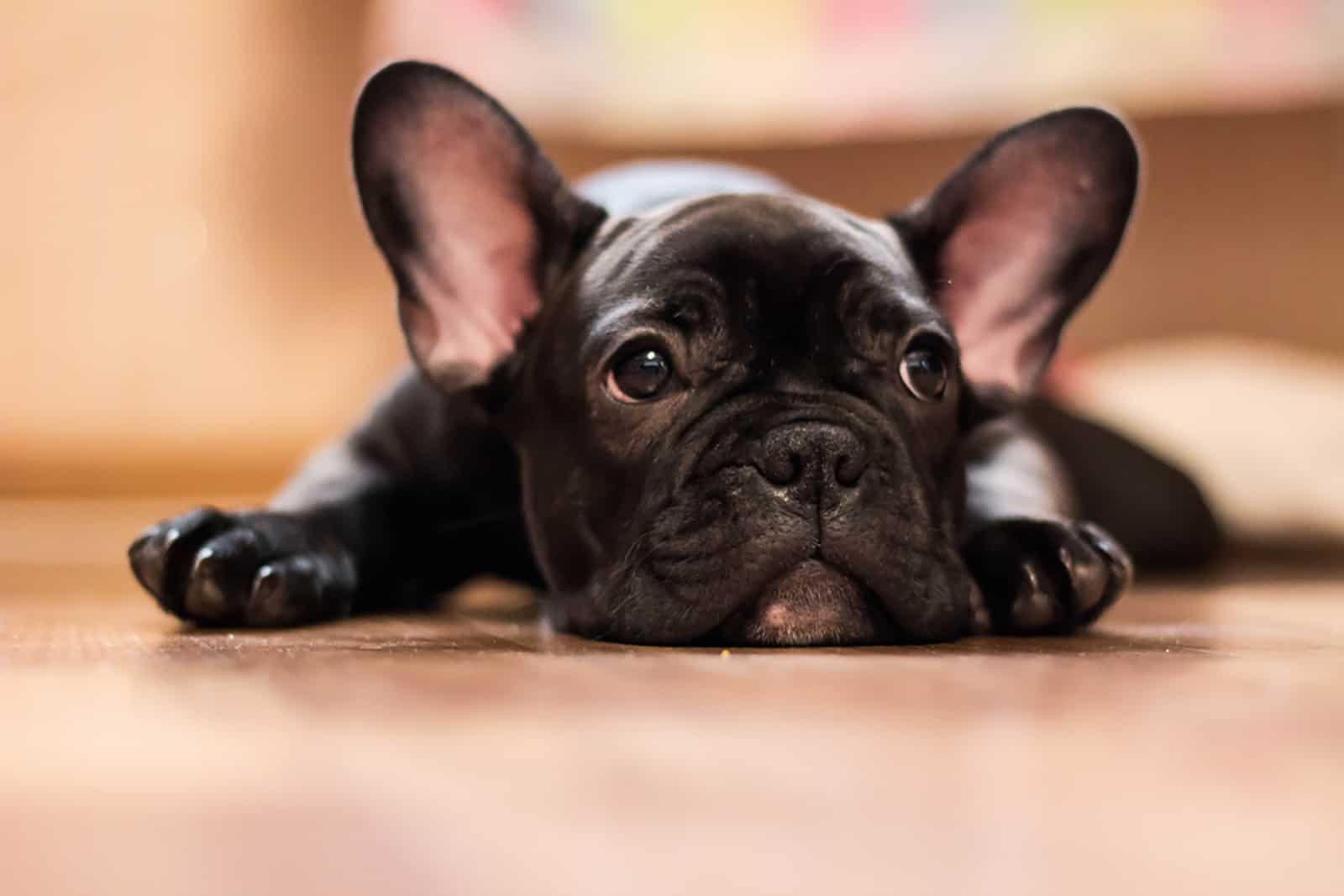
Black French Bulldog puppies can command a fairly high price, usually ranging between $3,500 and $5,000, although they have been known to go for up to $10,000 in some cases.
They are much more expensive than the standard Frenchie, because of their rarity and the fact that their breeding is largely discouraged in the community.
Where Can I Get a Black French Bulldog?
Getting a black Frenchie is not an easy task, and you should not expect to get one anytime soon. There are cases of people being on waiting lists for over a year.
The black coat does not occur naturally in French Bulldogs so the only way you can get one is by buying it from a specialized breeder. But even they can sometimes go for long periods without producing a single solid black puppy.
Conclusion
Black French Bulldogs are a really unique dog breed. Their distinguished appearance and rarity make them appealing to a lot of dog owners, but there are also some risks to consider.
If you intend to buy a black Frenchie puppy, we would urge you to take enough time to do all the necessary research beforehand.
This article contains a lot of useful information and it can be a great starting point for you to learn about this particular breed.
If you are having second thoughts, then maybe consider getting a brindle Frenchie instead. They are just as adorable and friendly, and they even look alike!
But, more importantly, they don’t have the same health risks that the black ones do, and they don’t come from questionable breeding practices.
Read Next: Tan French Bulldog: Everything About The Breed And Its Colors
